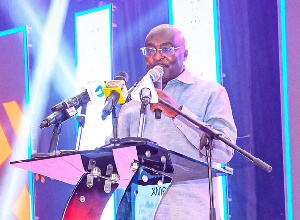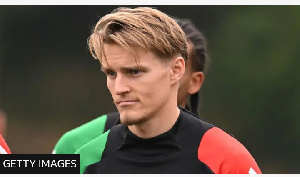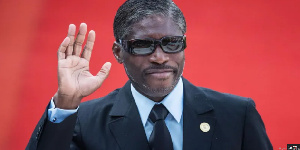 All four ministers have spoken against the advocacy for LGBTQ rights
All four ministers have spoken against the advocacy for LGBTQ rights
Among the most endearing conversations that have characterized the ongoing vetting of Nana Addo Dankwa Akufo-Addo’s nominees for various ministerial portfolios, is the one on Ghana’s stance on gay rights.
At least for the minister-nominees designated to ministries whose works directly involve the rights or otherwise of the sexuality or discussions on the rights of people of these sexual orientations, Members
Read full article.of Parliament (mostly those on the minority side of the House), have been bent on getting further clarity.
United States President, Joe Biden, recently launched a campaign to support LGBTQ people abroad, stating sanctions that countries yet to make laws that accommodate homosexuals could face.
The European Union in Ghana has also said it supports the promotion of LGBTQ rights by local civil society organizations in Ghana.
In a recent post on Facebook, it said, “A couple of weeks ago, the EU in Ghana, participated in the opening of the new community space of the @LGBTRightsGhana. Equality, tolerance and respect for each other are core values of the EU. The EU supports civil society organizations promoting #LGBTIQ rights, #EU4LGBT.”
Some of the attendees at a fundraiser for the office included the Australian High Commissioner to Ghana, His Excellency Gregory Andrews; and Danish Ambassador Tom Nørring among some delegates from the EU.
But these have not in the least ruffled the feathers of our leaders on their stance, and this was clearly demonstrated through the answers that four ministers-designates gave during their vetting at Parliament’s Appointments Committee.
The four, Shirley Ayorkor Botchwey, minister-designate for Foreign Affairs and Regional Integration; Sarah Adwoa Safo, minister-designate for Gender, Children and Social Protection; Godfred Dame, for Justice and Attorney General; and Kojo Oppong Nkrumah, minister-designate for Information, re-emphasized the stance of the government that it will not to give room for any such discussions to take place.
But, the response given by the Gender minister-designate, Adwoa Safo, seems to have been the most deep-cutting, if that description suffices, seeing that social media went agog on her comments.
Here is how the minister-nominees responded to the subject during their vetting:
Shirley Ayorkor Botchwey
Shirley Ayorkor Botchwey when answering a question during her vetting on Thursday, February 11, 2021, stated that Ghana’s laws clearly criminalize the practice.
She stressed that Ghana is a sovereign country and has its own laws that its citizenry must abide by regardless of the relationship the country has established with other countries.
“Ghana is a sovereign country but as part of our foreign policy we engage countries all over the world; America is one of our strongest friends. But in this country, we have laws. And our laws work and must work.
“So, in spite of what somebody will say and in this case President Biden, the laws of Ghana criminalizes on unlawful carnal knowledge and therefore the laws of Ghana definitely are supreme and that is what we all adhere to,” she noted.
Godfred Dame
The nominee said that the provisions of the Criminal Offences Act does not offend the Constitution at all and there are cultural rights recognized by the constitution.
In his personal view, he said that "it is only when the laws are applied in a way discriminatory of a particular group of people, that you cannot assert unconstitutionality. I take the view that the decision of the Supreme Court in the case of James Kwabena Bomfeh and the Attorney General on the National Cathedral itself is an affirmation of the fact that even though there are a multiplicity of religions in the country, any decision by a President to promote a particular religion is not discriminatory in the same way any practice of a people which seeks to promote its customs and values cannot be deemed to be discriminatory and for that matter, the section of the Criminal Code is not discriminatory at all.
"I think what is required is a free society that will not necessarily victimize persons but that should not be misconstrued to mean that the state cannot put in place certain laws which protect its customs and traditions of the people.”
Sarah Adwoa Safo
In her response to the question, she said, “Mr Chair, the issue of LGBT is an issue that when mentioned, it creates some controversy but what I want to say is that our laws are clear on such practice. It makes it criminal. Section 104 of the Criminal Code prohibits one from having unnatural carnal knowledge with another person. So, on the issue of its criminality, it is non-negotiable.
She continued that, “On the issue of our cultural acceptance and norms, these practices are also frowned upon. So, for me, these are two distinct clarities on the matter and that is what I strongly stand for,” she explained.
Kojo Oppong Nkrumah
The minister-designate for Information believes that a more radical approach should be adopted: develop a legislation barring the advocacy of LGBTQ activities.
According to him, given the current advocacy around the legalization of homosexuality in the country, the country needs to consider passing a law that tackles its promotion because the practice in itself is culturally unacceptable and goes contrary to section 104 of the Criminal Code, 1960.
“Customary law frowns on LGBT activities. People say despite the criminal code on the general position of customary law, it is just mere expression, they are just advocating for it but if you ask me about law and background, I will say that is when somebody like me will argue that then we should be able to contemplate legislation in the interest of public morality which will not be against the constitution but we will now say that you cannot advocate for and promote LGBT activities in this country,” he averred.










